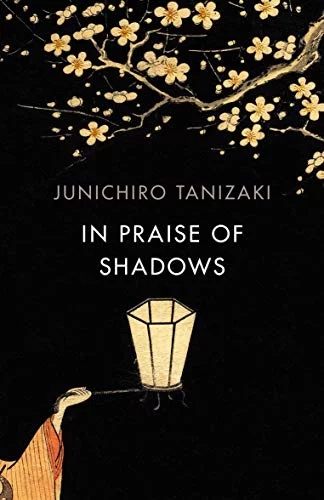In this fascinating book length essay, Japanese author Junichiro Tanizaki mesmerises, teases, provokes and even exasperates his readers with a degree of deliberateness that is calculated yet spontaneous; facetious yet severe. Tanizaki dwells with great vigour on an aesthetic that has its edifice in the murkiness of shadows, not just symbolically, but literally. Arguing that the Japanese sensibilities derive their glow and shine from the tranquillity and serenity of shadows, Tanizaki bemoans the unstoppable annihilation of the profundity of shadows, hastened by a profusion of Western progress one of whose inevitable handmaidens is the harsh glare of the electric light.
In Praise of Shadows takes us to places unusual and acquaints us with material objects otherwise ordinary in embellishing the worth of shadows. Prior to the advent of electricity, Japanese houses served dinner in lacquerware under the muted glow of candles. Tanizaki extolls the beauty of lacquerware that is revealed only under the benevolent gaze of shadows. “Darkness is an indispensable element of the beauty of lacquerware…” Frowning upon the increased use of ceramic, Tanizaki contends that “there is a beauty in that moment between removing the lid and lifting the bowl to the mouth when one gazes at the still, silent liquid in the dark depths of the bowl, its colour barely differing from that of the bowl itself..”
Tanizaki is neither an apologist for medieval mores of living nor a confirmed Luddite. His obsession for shadows does not translate to a jeremiad lamenting the discovery of the incandescent bulb. “I know that I am only grumbling to myself and demanding the impossible understanding that things have changed, and some will never be the same again.”. Probably if In Praise of Shadows was to be authored today, it might have birthed an immediate zeitgeist with cultural, architectural and even social ramifications. The genre itself might have worked as a bildungsroman making a reverse transition from light to darkness. Tanizaki startles his readers by making questionable switches from the profound to the petty and vice versa. His ruminations span a bewildering range from architecture to toilets, to jade to women to food.
In Praise of Shadows is a man’s personal angst in attempting a reconciliation between an inevitable future and a nostalgic past. An endeavour that extrapolates in a futile vein, personal wistfulness to universal longing. “The tatami room is fine as far as it goes, but it is the design of the toilet that truly soothes the mind and soul. To squat in the faint glow of the light reflecting off the shoji and surrender to a meditative state or gaze out the window at the garden scenery is a sensation that is impossible to describe.” What a far cry from the contemporaneous toilet design!
Tanizaki also posits an incredulous theory equating the beauty of a Japanese women with darkness. In a darkened room, the beauty of a Japanese woman finds exquisite expression in the view of Tanizaki where all that is visible is a powdered face and two hands extending from a dark mass of clothing. Much before ‘stream of consciousness’ was elevated to a kitschy pedestal, writers like Tanizaki defined this oeuvre with delightful confoundedness.
Thomas J. Harper, one of the translators, creating magic out of this Tanizaki tract has an interesting story which reflects the paradoxical and a near hypocritical view nurtured by Tanizaki. Tanizaki decided to build himself a new home. An ebullient and egregious architect who happened to have read In Praise of Shadows, offered to construct a dwelling that exactly mirrored Tanizaki’s notions and aspirations regarding the much vaunted and regrettably forgotten Japanese aesthetics. To the architect’s utter chagrin and surprise, Tanizaki replied, “but no, I could never live in a house like that.” Call it a sly sense of humour or an informed expression of resignation, it denotes Tanizaki’s willing acceptance to evolve with and adapt to changing mores and time.
One of the greatest philosophers of all time, Rumi said, “The wound is the place where the Light enters you.” Tanizaki would have preferred to “let only measured rays of light to enter the wound.”
Thomas J. Harper and Edward G. Seidensticker have done an indescribably capital job with translating the original work preserving its essence
In Praise of Shadows is a delectable take on darkness and light, loss and gain, and more than everything else, a mercurial man’s attempt to come to grips with himself.

